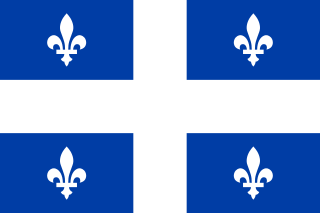
Sir Jean Lomer Gouin, was a Canadian politician. He served as 13th Premier of the Canadian province of Quebec, as a Cabinet minister in the federal government of Canada, and as the 15th Lieutenant Governor of Quebec.

This section of the Timeline of Quebec history concerns the events relating to the province of Quebec, Canada between the enactment of the British North America Act and the end of the 19th century.

Edmund James Flynn was a Canadian politician and the tenth Premier of Quebec.
In the Quebec general election of 1892 on March 8, 1892 to elect members of the Legislative Assembly of the Province of Quebec, Canada. The incumbent Quebec Conservative Party, led by Charles-Eugène Boucher de Boucherville, defeated the Quebec Liberal Party, led by Honoré Mercier.
The Quebec general election of 1886 on October 14, 1886 to elect members of the 6th Legislative Assembly for the Province of Quebec, Canada. The Parti National, a broad coalition formed and led by Honoré Mercier, that included the Parti libéral du Québec and nationalist defectors from the Conservative party. The Parti national got a large boost when Liberals and dissident Conservatives rallied in reaction to the hanging of Louis Riel in 1885, for which the federal Conservatives were held responsible by Quebec voters. The nationalists won a majority of seats against the Parti conservateur du Québec, led by John Jones Ross.

Sir François-Xavier Lemieux, often referred to as F.X. Lemieux, was a Quebec lawyer, judge and political figure. He represented Lévis in the Legislative Assembly of Quebec from 1883 to 1892 and Bonaventure from 1894 to 1897. Lemieux was also Louis Riel's lawyer in 1885.

James McShane was a Canadian businessman and politician. He was mayor of Montreal, a member of the Legislative Assembly of Quebec, and a member of the House of Commons of Canada.
The 18th Quebec Legislature is the provincial legislature that existed in Quebec, Canada from August 24, 1931, to October 30, 1935. The Liberal Party led by Louis-Alexandre Taschereau had a majority of seats in the Legislative Assembly of Quebec and remained in power in the government.
The 15th Legislative Assembly of Quebec is the provincial legislature in Quebec, Canada that existed from June 23, 1919, to February 5, 1923. The Quebec Liberal Party led by Lomer Gouin and Louis-Alexandre Taschereau was the governing party. Taschereau succeeded Gouin in 1920 as Premier of Quebec.
The 14th Legislative Assembly of Quebec was the provincial legislature in Quebec, Canada that existed from May 22, 1916, to June 23, 1919. The Quebec Liberal Party led by Lomer Gouin was the governing party.
The 13th Legislative Assembly of Quebec was the provincial legislature in Quebec, Canada that existed from May 15, 1912, to May 22, 1916. The Quebec Liberal Party led by Lomer Gouin was the governing party.
The 7th Legislative Assembly of Quebec was the provincial legislature that existed in Quebec, Canada from June 17, 1890, to March 8, 1892. The Quebec Liberal Party led by Honoré Mercier was the governing party for most of the mandate. The party was also known as the Parti national which composed previously of Conservative dissents that formed a new party, the Parti National. However, Mercier was dismissed by the Lieutenant-Governor Auguste-Réal Angers due to a scandal and the final months of the Assembly was led by Charles Boucher de Boucherville of the Quebec Conservative Party. Due to the minority status of the government in the final months, an election was immediately called.
The 6th Legislative Assembly of Quebec was the provincial legislature in Quebec, Canada that existed from October 14, 1886, to June 17, 1890. During most of the term, the Quebec Liberal Party, also known as the Parti national as that period, was the governing party. However, the Quebec Conservative Party despite losing the election tried to form a minority government with John Jones Ross and Louis-Olivier Taillon as Premiers but only managed to last a few months before the Liberals led by Honoré Mercier, the founder of the Parti National, formed a narrow majority government with 33 of the 65 seats of the Legislative Assembly of Quebec.
The 4th Legislative Assembly of Quebec was the provincial legislature in Quebec, Canada that existed from May 1, 1878, to December 2, 1881. The Quebec Liberal Party led by Henri-Gustave Joly de Lotbinière formed the minority government in the first year of the term but lost a confidence vote in 1879. The Quebec Conservative Party led by Joseph-Adolphe Chapleau then formed a minority government for the remainder of the mandate with the support of two Conservative Independent MLA's.

Joseph-Hormisdas Legris was a politician in Quebec, Canada. He served as Member of the Legislative Assembly (MLA), Member of Parliament (MP) and Senator.

Arthur Boyer was a Canadian politician in the province of Quebec.
The Parti National was the name taken by the Liberal Party of Quebec, Canada, under the premiership of Honoré Mercier.
Honoré Mercier Jr. was a member of the Legislative Assembly of Quebec and the son of Honoré Mercier, former Premier of Quebec and father of Honoré Mercier III.
Honoré Mercier III was a member of the Legislative Assembly of Quebec, the grandson of Honoré Mercier and the son of Honoré Mercier, Jr..









